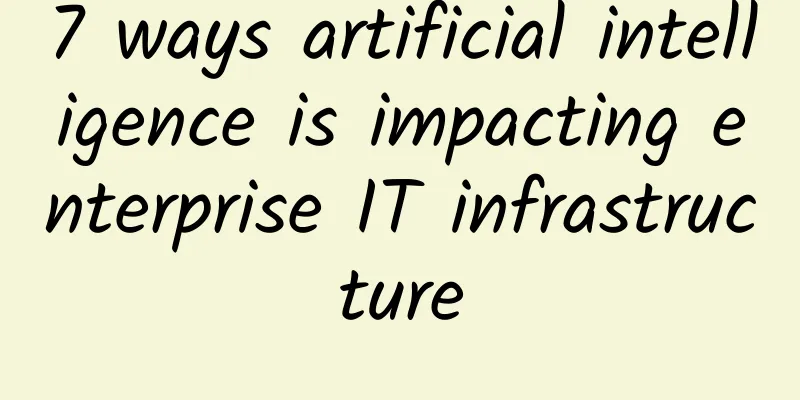7 ways artificial intelligence is impacting enterprise IT infrastructure

|
Artificial intelligence (AI) technology has gained momentum over the past few years, and many industry analysts believe that AI will have a significant impact on enterprise IT in the near future. IDC predicts that worldwide spending on cognitive systems and artificial intelligence will climb from $8 billion in 2016 to $47 billion in 2020. “Software developers and end-user organizations have begun embedding and deploying cognitive/AI into business processes across nearly every enterprise,” said David Schubmehl, research director at IDC. He added: “The awareness and understanding of AI and the growth opportunities this technology can bring to businesses will be factors in most companies’ consideration of AI, while the disruption of digital transformation caused by AI will be fatal.” Among the top ten strategic technology trends listed by Gartner for 2017, the top three are AI and machine learning, intelligent applications, and intelligent projects, all of which revolve around artificial intelligence. How does AI impact an enterprise’s IT infrastructure? 1. Increased resource requirements
AI systems require a lot of computing power, and to support them, companies need access to servers with multi-core processors or cloud computing services. In addition, to build machine learning systems, companies need a lot of data, which means more storage capacity. Of course, organizations also need a lot of network resources to support these computing and storage systems. 2. Security Intelligence
Security solutions generate a large amount of log data that IT managers can no longer manage manually. More and more security analytics, threat intelligence, and user entity behavior analytics (UEBA) products use machine learning and advanced algorithms to identify and mitigate attacks. However, black hats will soon begin integrating AI into their code. It may only be a matter of time before AI-based cyberattacks become commonplace. 3. Intelligent monitoring In addition to helping with network security, AI can also help monitor networks and other infrastructure. For example, the Dynatrace platform provides full-stack monitoring based on AI, which integrates machine learning and big data analysis capabilities to provide IT professionals with intelligent monitoring capabilities, making it easier for them to do their jobs. Other vendors in this field include Spunk and SumoLogic, whose products are more broadly focused on analyzing various machine data, but can be used for network monitoring. 4. Automatic help support
People have become accustomed to intelligent assistants like Cortana and Siri, and customer service chatrooms are becoming more common. Soon, AI will be able to take over these self-help duties. IPSoft has created an AI called Amelia that can perform some of these functions. Platforms like IBM's Watson offer similar capabilities and can help relieve some of the IT burden and support the organizations they serve. 5. Intelligent storage
Some storage experts expect AI to also be used for storage management. Machine learning tools can learn IO patterns and data lifecycles, allowing storage solutions to make smarter decisions related to storage optimization and tiering. Perhaps one day, AI can even predict that storage solutions will fail, giving users time to back up data and replace hardware before it becomes a problem. 6. AI for infrastructure management
Some experts envision a future where AI not only protects, manages, and troubleshoots issues concerning networks, but actively manages and maintains these systems. This level of automation is sometimes referred to as self-driving infrastructure or AI-defined infrastructure. Trends such as software-defined data centers and orchestration tools such as Kubernetes are making this vision possible. 7. Impact on people
Of course, in any discussion about AI, people will wonder whether robots will eventually take over their jobs, especially some IT infrastructure management positions. In May, Gartner released this prediction: "AI will eventually replace many routine functions of IT organizations, especially in operations, such as system administration, help desk, project management and application support." However, many experts believe that while AI will change the nature of the work that humans are doing, it will not reduce the number of jobs available to humans. Gartner added: "Some jobs will disappear, but AI will improve the skills shortage and the entire IT organization can increasingly focus on innovative work." |
<<: Design of high-density WiFi terminal occupied air interface resources calculation method
>>: Tips for installing and using wireless routers
Recommend
The future of Internet streaming: Ultra-high-definition displays
As we stand on the precipice of a new era in digi...
How to keep a remote SSH session running after a disconnect
SSH (Secure Shell) is an end-to-end encrypted net...
Transforming the digital experience with 5G
Transforming digital experiences, products, servi...
AI-powered platforms enable business agility, help operators achieve digital transformation and achieve business success
[Shenzhen, China, July 30, 2020] Today, at the &q...
5G is not over yet and 6G is coming? Here is a comprehensive review of the global "6G relay race"!
While governments, enterprises, and research inst...
[5G Encyclopedia] The mysterious relationship between parameter sets and numerology
When I first saw the word "Numerology" ...
[Black Friday] Friendhosting 40% off, VPS half-year payment starts from as low as 10 Euros
Friendhosting released this year's Black Frid...
Hostmem: $11.99/year KVM-512MB/10GB/500GB/Los Angeles data center
Hostmem is a Chinese VPS service provider. The tr...
spinservers: 10Gbps bandwidth US server $99/month - 2*E5-2630Lv3/128GB/1TB NVMe/30TB/month
spinservers has just released this month's pr...
5G, you will be able to make phone calls
Yes, the title is correct. 5G will enable phone c...
Want to replace WeChat? The three major operators announced one after another, Tencent has a new rival
As the largest social software in China, WeChat h...
Google withdraws from 2021 MWC World Mobile Communications Conference
The annual MWC World Mobile Communications Confer...
The UK officially bans Huawei 5G equipment! Officials respond quickly
The UK has just officially announced that Huawei ...
What basic principles should be followed to improve data center operations planning?
Enterprises need to develop an effective and adap...
Security monitoring and observability capability building based on system operation experience
Observability refers to the ability to measure th...









